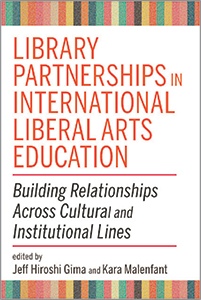
Primary tabs
You don't need to be an ALA Member to purchase from the ALA Store, but you'll be asked to create an online account/profile during checkout to proceed. This Web Account is for both Members and non-Members. Note that your ALA Member discount will be applied at the final step of the checkout process.
If you are Tax-Exempt, please verify that your account is currently set up as exempt before placing your order, as our new fulfillment center will need current documentation. Learn how to verify here.
- Description
- Table of Contents
- About the authors
Internationalization continues to gain traction among US colleges and universities as overseas branch campuses now dot the globe alongside an established and growing group of independent American-modeled institutions of higher education, some founded as early as the 19th century. As higher education and the academic library environment evolves, librarians at many of these independent institutions are identifying priorities that include not only collaborating with educational stakeholders, enhancing teaching and learning, and connecting to the institution’s mission, but also positioning themselves as active and creative partners in increasingly digital learning and scholarship. An international environment is both a challenge and an opportunity for these priorities.
Library Partnerships in International Liberal Arts Education explores these challenges and opportunities through perspectives that are inherently international and intercultural because of the authors’ own backgrounds, and in particular because of their institutional environments. The authors are librarians, faculty, and technologists at institutions that belong to the AMICAL Consortium, a consortium of American-modeled international liberal arts institutions working together on common goals for libraries, technology, and learning. The chapters describe library-anchored collaborations that demonstrate struggles, but also successes and rich possibilities, in these thoroughly international—and increasingly digital—liberal arts institutions. They provide cumulative knowledge, reference points, and aspirational targets for planning future library-related collaborations in similar environments.
While a fascinating look at new collaborative roles and digitally focused priority areas for academic librarians as they are being addressed within AMICAL’s membership, the compelling ideas arising from these intercultural contexts have broad application and introduce opportunities to engage in international collaboration with the members of this unique consortium.
Foreword
Celeste Schenck
Introduction
Jeff Hiroshi Gima and Kara Malenfant
Chapter 1. Researching Rome: The Librarian as Research Mediator
Livia Piotto
Chapter 2. The Digital Humanities in the Global Liberal Arts: Discovery and Collaboration
Laurence Amoureux, Elizabeth Kinne, and Everett Robinson
Chapter 3. Embedding Information Literacy into a Humanities Course Using the ACRL Framework as a Guide: A Faculty-Librarian Collaboration Model
Aziz El Hassani
Chapter 4. Changing a Teaching Culture in an International University Context: Introducing English and Research Competencies for the Price of a Cup of Coffee
Dr. Tara Keenan, Dr. Manlio Perugini, and Dr. Seth N. Jaffe
Chapter 5. Partnering for Transformation: Strategically Adopting a Collaborative Library-Faculty Mind Set
Jyldyz Bekbalaeva
Chapter 6. Partnering for Egyptian Heritage Oral History: Internal and External Collaborations Pursued by the Archives
Stephen Urgola
Chapter 7. A Collaboration through Three Digital Humanities Projects: Challenges and Perspectives
Mariette Atallah and Elie Kahale
Chapter 8. Digital Humanities and the Preservation of Cultural Heritage: Opportunities and Challenges
Abdelaziz Galal
Chapter 9. One-World Classroom: Designs for Global Learning across the AMICAL Network
Dr. Tamo Chattopadhay and Maya Sharsheeva
Chapter 10. Libraries and Collaborative Capacity Building for International Digital Liberal Arts
Jeff Hiroshi Gima
About the Authors
Jeff Hiroshi Gima
Jeff Hiroshi Gima is Director of the AMICAL Consortium, through which he facilitates collaboration among librarians, technologists, and faculty at twenty-nine American-modeled colleges and universities located across Europe, Africa, the Middle East, and Central and Southern Asia. He is based at The American University of Paris. After receiving his BA in physics from Reed College, he began work as a librarian and educator, building a high school library where he taught math in rural Zimbabwe as a Peace Corps volunteer. Jeff received his MS in library and information science from the University of Illinois at Urbana-Champaign, attended courses at the Ecole Nationale Supérieure des Sciences de l’Information et des Bibliothèques in Lyon, and has worked in academic, public, and school libraries. Contact him at jgima@amicalnet.org.
Kara Malenfant
Kara Malenfant is a senior staff member at the Association of College and Research Libraries (ACRL, a division of the American Library Association), where she coordinates government relations advocacy and scholarly communication activities and is the lead staff member on the Value of Academic Libraries initiative. She provides consulting services on organizational development and use of ACRL’s standards for libraries in higher education. Kara began her position at ACRL in fall of 2005, after working for six years at DePaul University Libraries in Chicago. Prior to her experience as a librarian, Kara worked in Washington, DC, for the Armenian Assembly of America and served as a Peace Corps volunteer in the first group posted to the Republic of Armenia. Kara holds a doctor of philosophy degree in leadership and change from Antioch University, an MS in library and information science from the University of Illinois at Urbana-Champaign, and a BA in English from Allegheny College. Contact her at kmalenfant@ala.org.


